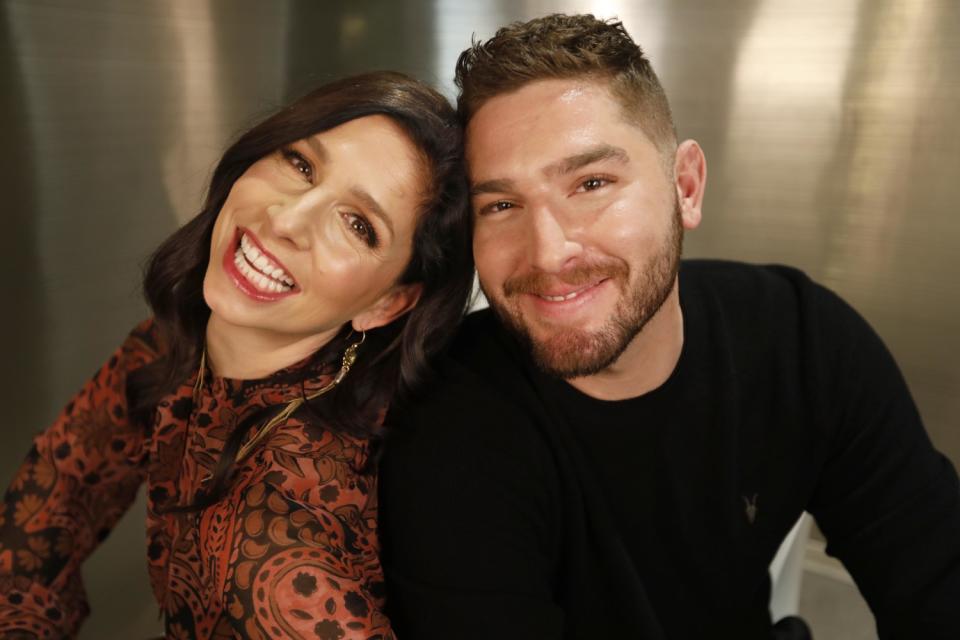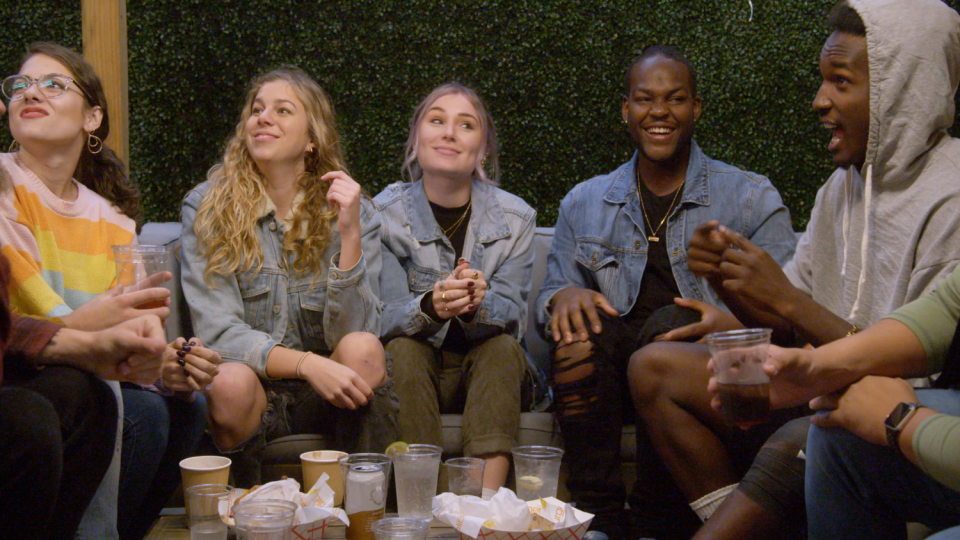Commentary: 'Deaf U' doesn't represent all deaf people. It shouldn't have to

When I started watching “Deaf U,” Netflix’s docusoap about a group of students at Gallaudet University, the first thing I noticed was a gradual pain in my cheeks. Then I realized it was because I couldn’t stop smiling.
I immediately fell in love with the series’ charismatic subjects: the hilarious Rodney (and his incredible family); the probing and thoughtful Renate; Alexa, on a search of self by way of other people; Cheyenna, fighting for a space to call her own; Cameron, the truth-telling friend everyone wishes they had; Daequan, who only just learned to sign and as a result seems to be discovering himself; and the sweet, if eternally eating ramen, Dalton.
As seems to be a pattern for films and TV series that represent marginalized groups, “Deaf U,” which premiered Friday, has attracted criticism, particularly from within the deaf community. Some of these concerns, addressed by executive producers Nyle DiMarco and Naimah Holmes in a Gallaudet University panel this week, are valid — particularly the lack of racial diversity among the women of the cast. But many critics’ apparent desire for the show to be an entirely different beast than what it actually is may have less to do with “Deaf U” itself, and more to do with its underrepresented and underserved audience.
Though this frustration is understandable, given the embarrassingly few opportunities our community has had to see and be seen, it also sells short the central achievement of “Deaf U”: the students’ hopeful openness about issues like mental health and sexual positivity, even in the face of sexual trauma, and, most of all, their consistent refusal to feel shame about their choices — something unheard of (pun only slightly intended) even during my own stint at Gallaudet.
While “Deaf U’s” very genre, the docusoap, is consciously designed to highlight and sensationalize conflict, almost none of its reality TV counterparts have the responsibility of representing a community so rarely seen onscreen. As the brilliant deaf writer Sara Novic wrote on Twitter, “d/Deaf people are so marginalized and starved for mainstream representation that we have to pin all our hopes and needs on this one (or any single) series.” Only “if Deaf people were routinely, authentically represented (especially including BIPOC and LGBT intersections) outside the fetish zone” could the problem be fixed.

The existence of this “fetish zone” to begin with is born out of a simple truth. For a long time, only a very specific group of people has been afforded the privilege of telling the stories the rest of the world sees. We’ve become accustomed, even conditioned, to their perspective being the default. And if you’re not a member of that group, you are forced to find representation in people who aren’t like you at all, because the times that you do see yourself onscreen are few and far between. Maybe you’ve even learned how to regulate yourself in order to better fit the story that other people have told, and continue to tell, about you.
As I think the students in “Deaf U” are now learning, when you are granted the rare opportunity to be seen, it comes with a responsibility you carry with you every day. And just because you become accustomed to the weight doesn’t mean it goes away. The desire to be seen is part of the universal human condition, perhaps because the reality is that so few of us are. And even when we are seen, there is so much behind our path to that place that remains unseen.
The truth is that no show is ever one person’s, even when you create and write it, like I did with Josh Feldman on our SundanceTV show “This Close.” There is a countless barrage of notes and needs from the network, the studio, and your other producers.
Josh and I represented two out of the 10 executive producers our show had over the course of two seasons. Of course, much of this experience was cathartic and satisfying. But there were also times when I felt very small and powerless, like I was adrift on a tiny raft I’d somehow managed to cobble together in a vast ocean.
I have not told this part of my story before now because it matches the expected frame on my experience — one of struggle and disappointment. But maybe part of being a member of an underrepresented community is the constant need to push against stereotypes, even as you fall victim to them. The fact of the matter is that it is harder, much harder, for a deaf person to succeed anywhere in this world. And when it’s harder to succeed, it’s also harder to make mistakes.
Consider that 90-95% of deaf people do not acquire language — the most intimate and basic of human rights — on schedule. As someone who was born deaf, I’ve never felt that the inability to hear is where my struggle lives. Instead it lives in the belief that when it comes to communicating, the onus falls directly on me. Depending on the person I’m with, I’m expected to sign fluently or differently or not at all. And if it’s not at all, then I must speak fluently or with more or less of an accent and naturally, must read lips fluently and easily and travel with an interpreter in my back pocket, available at all hours and without cost.

This is the invisible enemy that both unites us and divides us as deaf people. We can’t really name this enemy because sometimes we quite literally don’t have the vocabulary to do so, much like Daequan in “Deaf U,” who describes not knowing he was deaf because he was never told that he was. At other times, it’s because this enemy is too vast, too powerful to really grasp. Every decision-maker in the greater world we all live in is hearing. Every network chief, every studio head, every development executive, every suit you sit down to dinner with, every unseen entity that eventually gives your show the green light.
“Deaf U’s” version of the deaf experience is limited, but only because all shows, much like the people behind and in them, have limitations. It is impossible for a single show, or for a single person, to represent all of us, though we collectively hunger, even starve, for this. And so if you’re allowed the privilege of being the one that represents, the one that is seen, you do the work the best you can. This will mean succeeding in some areas while failing in others. Sometimes these failures will be yours, and sometimes they will be other people’s, but for some inscrutable reason, you must shoulder the responsibility for them. At the end of the day, it doesn’t stop any of them from being what they are — mistakes.
But where there are mistakes, there is also victory. I think the triumph of “Deaf U” is in its ability to show that deaf people make the same mistakes that hearing people make — and, more important, have been allowed to make. Because if we refuse to allow this, it’s difficult to see this refusal as coming from anywhere else but a place of fear: fear that the outside world will think those mistakes are all that we are. This fear has to be the result of years and years of systemic and internalized audism and ableism because it tells us that we must continually prove to not just hearing audiences, but also to ourselves, that we are just as good, or maybe even better than they are. Because if we are, then we might finally feel worthy of the lives we see other people living and want so badly to live for ourselves.
To be allowed mistakes is to be allowed potential. And potential is the chance to improve, yes, but also the chance to expand. Expansion means more space — and it is in this space where more people will be hired to tell the stories we want to tell. Because I believe the ultimate solution is not less stories, but more. That is the path to more nuanced representation, to seeing people along spectrums, at intersections and within communities that have yet to be seen with the frequency and thoughtfulness that they deserve — people, particularly women of color, LGBTQ people and the disabled deaf, to scratch the surface.
This may explain why the individual and collective bravery of the cast of “Deaf U” not only made me smile, but also astonished me and brought me to tears. As is often the case, the student becomes the teacher, and what “Deaf U” so richly demonstrates is that there is no right way to be deaf. That would mean you could never be wrong — and without being wrong, without being allowed to be wrong, we cannot learn, we cannot grow and, finally, we cannot heal.
This story originally appeared in Los Angeles Times.


